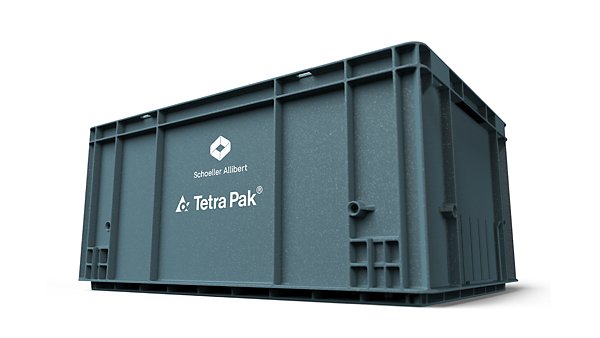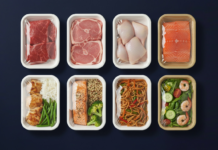In a step towards a circular economy and as a result of close collaboration, Tetra Pak and Schoeller Allibert will launch a new transport crate made of polyAl from used beverage cartons at the Plastics Recycling Show in Amsterdam from 1 to 2 April 2025.
Schoeller Allibert is a leading global manufacturer of returnable transport packaging solutions. By integrating up to 50% polyAl from used beverage cartons with raw materials from other recycled streams (without using any virgin materials), Schoeller Allibert has developed warehouse crates and other reusable logistics packaging that meet high industry standards for performance and durability, offering more sustainable and cost-competitive alternative to conventional offerings.
The crates are currently undergoing rigorous quality and durability field tests. Once validated, Tetra Pak will gradually replace over 50,000 crates used at its global spare parts distribution center in Lund, Sweden.
Beyond Tetra Pak, Schoeller Allibert is already engaging with other potential customers to adopt this material for their returnable transport packaging needs.
Britta Wyss Bisang, VP sustainability and strategic MarCom, Schoeller Allibert highlighted the role of material innovation in building more efficient and sustainable supply chains: “For our customers, making supply chains more sustainable is a key priority, and material innovation is one of the main drivers in making that happen. That’s why we are heavily investing in new ways to reduce the use of virgin plastic and use recycled materials such as polyAl. This project demonstrates how advanced recycling solutions can turn waste into durable, reusable packaging that supports circular logistics and thereby the transition to a circular economy.”
Kinga Sieradzon, vice president sustainability operations, Tetra Pak says, “Aseptic cartons are crucial to providing food access and safe nutrition. And, at Tetra Pak, we know how important it is to also consider its end of life, keeping valuable materials in use.
“Over the years, we have been exploring viable applications for the recycled material polyAl, and we are pleased to see that our collaboration with Schoeller Allibert has resulted in a robust, competitive industrial product. We will continue to work with recyclers around the world to develop commercially viable products and expand their end market, thereby helping to reduce virgin plastic use and driving progress towards a circular economy.”
Marie Sandin, managing director of Tetra Pak Sweden adds, “At the Tetra Pak site in Lund, Sweden, we have actively worked over the past year to introduce sustainable and recycled materials in everything we do. For instance, we now have both indoor and outdoor furniture for our employees made from polyAl material. Our objective with this initiative, together with Schoeller Allibert, was to develop a sustainable and cost-efficient crate that delivers high performance. The results look very promising for our daily operations, using polyAl crates made from approximately 200 recycled beverage cartons each.”
Aseptic beverage cartons are made up of, on average, 70% paperboard made from wood sourced from FSC™ certified forests and other controlled resources. The remainder is made up of an ultra-thin aluminium layer that shields food from light and oxygen and thin layers of polymers that block moisture and hold the layers together. Such multi-layered structures enable the package to protect the food inside and allow for distribution and storage at room temperature.
In recycling, the fibres in the cartons are extracted at paper mills. The remaining mixture of polymers and aluminium can be turned into polyAl pellets for products such as pallets, crates, logistics packaging and outdoor furniture.
Visit the Food & Beverage Carton Alliance booth at the Plastics Recycling Show in Amsterdam on 1 and 2 April 2025 to find out more.
IndiFoodBev — authentic, impactful and influential
An English-language food and beverage processing and packaging industry B2B platform in print and web, IndiFoodBev is in its third year of publication. It is said that the Indian food and beverage industries represent approximately US$ 900 billion in revenues which implies more than 20% of the country’s GDP. Eliminating the wastage on the farmside can help to deliver more protein to a higher number of the population apart from generating sizable exports. The savings in soil, seeds, water, fertilizer, energy and ultimately food and nutrition could be the most immense contribution that country is poised to make to the moderation of climate change.
To improve your marketing and grow sales to the food and beverage processing and packaging industry, talk to us. Our research and consulting company IppStar [www.ippstar.org] can assess your potential and addressable markets in light of the competition. We can discuss marketing, communication, and sales strategies for market entry and growth.
Suppliers and service providers with a strategy and budget for targeted marketing can discuss using our hybrid print, web, video, and social media channels to create brand recognition linked to market relevance. Our technical writers are ready to meet you and your customers for content.
The second largest producer of fruit and vegetables in the world is continuously expanding processing capacities and delivery systems with appropriate innovative technologies. We cover product and consumer trends, nutrition, processing, research, equipment and packaging from farm to thali. Get our 2025 media kit and recalibrate your role in this dynamic market. Enhance your visibility and relevance to existing markets and turn potential customers into conversations. Ask for a sample copy of our bi-monthly in print or our weekly IndiFoodBev eZine each Wednesday.
For editorial info@ippgroup.in — for advertisement ads1@ippgroup.in and for subscriptions subscription@ippgroup.in
Naresh Khanna – 10 February 2025
Subscribe Now











